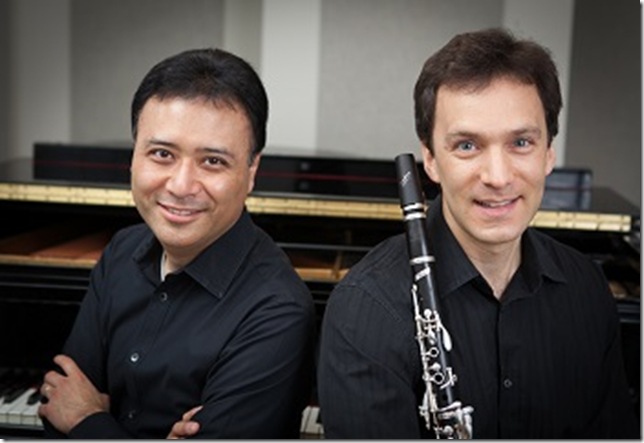When two brilliant first-prize winners get together to form a duo, what you get is brilliant music making.
Jon Manasse, principal clarinet of the Orchestra of St. Luke’s and the Mostly Mozart Festival Orchestra, won top prize in Munich’s International competition for clarinet, and pianist Jon Nakamatsu won the coveted gold medal in the 1997 Van Cliburn International competition.
Joking about how they were put together by their agent and how they met, Manasse was describing how tough it is making reeds for his clarinet, how his breathing has to be just right and how he has to keep very fit to be on top of things, when the other Jon (Nakamatsu) said, “Why bother? It seems hardly worth it.”
This self-deprecating sense of humor ran throughout their Feb. 11 program at the Chamber Music Society of Palm Beach, with digs about the one never letting the other have the chance to use the mic to announce their program. They obviously respect each other greatly.
Opening with Brahms Clarinet Sonata No. 2 (in E-flat, Op. 120) Manasse described how Brahms’ deep, unresolved love for Clara Schumann, wife of his best friend, Robert Schumann, was reflected in his composition. Indeed it is powerful music. Manasse’s breath control was immaculate, and in his lithe athletic body movements, the quintessence of a fit young man.
The Grand Duo Concertant by Carl Maria von Weber followed, teeming with incredible virtuosity for both instruments. Harmonic runs abound, beautiful to hear, excellently played by these two masters. Toward the end there were lots of tricky scales, trills and very high notes from the clarinet. It met with wild audience applause. Weber, it appears, had a favorite clarinet player for whom it was written. The two men toured Europe and became very successful, much to the surprise of the composer.
Next came music by Francis Poulenc, his Clarinet Sonata, especially composed for Benny Goodman, Sonata for Clarinet and piano, specially composed for Benny Goodman, the King of Swing, who in his later years commissioned works from “serious” composers such as Bartok, Stravinsky, Hindemith and Copland.
Planned for a Carnegie Hall debut in 1963 with Poulenc at the piano, the composer’s sudden demise earlier that year had Leonard Bernstein stepping in to accompany. The piece is divided into three. The opening Allegro opens with a jaunty clarinet jumping around in thirds. It becomes quieter and quite lovely with the clarinet repeating a certain phrase over and over, as if it were addictive. The piano picks out the next tune, copied by the clarinet, whose low tremolos end the movement.
The Romance is just that, hinting at the composer’s melancholia, which he often felt toward the end of his life. It ends on a double pianissimo, prescient perhaps, given his untimely death. The third part, also marked Allegro, begins with lively runs and suggestions of music from the casbah with plenty of dotted notes and exciting playing from both masters. Plaintive piano music is at times interrupted by brilliant clarinet runs: Poulenc at his final best.
A piece by Paquito D’Rivera came next. Just one movement of the four composed was heard. Manasse sat on the edge of the stage playing from memory, then moved through the audience, still playing. Nakamatsu then seized the mic and dismissed Manasse to everyone’s amusement saying he’d play Chopin’s Fantasie-Impromptu (Op. 66).
He asked that we listen for a tune, later to become a popular song. It was of course I’m Always Chasing Rainbows. The great American composer of popular songs, Irving Berlin, once said he got his best inspirations from the classics. Playing from memory, Nakamatsu brought out the wonderful contrasts with brilliant playing that, to quote his friend, the other Jon, “was mesmerizing.” Indeed it was.
Lastly came a rag by John Novacek called Schenectady, from his suite Four Rags for Two Jons. Scott Joplin’s jazzy rhythms came to mind as clarinet and piano tackled exciting syncopated music and incredible breathtaking runs. Another commission, specially written for the two men.
George Gershwin’s I Got Rhythm ended the evening. A happy occasion made enjoyable by two fine young artists at the top of their game, who with a touch of humor had great appeal to the common man.
***
The young two-piano team of Anderson and Roe appears next in the Chamber Music Society of Palm Beach series on Thursday, March 20, with music by Stravinsky and Mozart. Cocktail reception at 6 p.m., concert at 7 p.m., at Mar-a-Lago, Palm Beach. Call 561-379-6773 or visit cmspb.org.
Rex Hearn founded the Berkshire Opera Company and frequently contributes to Palm Beach ArtsPaper.
